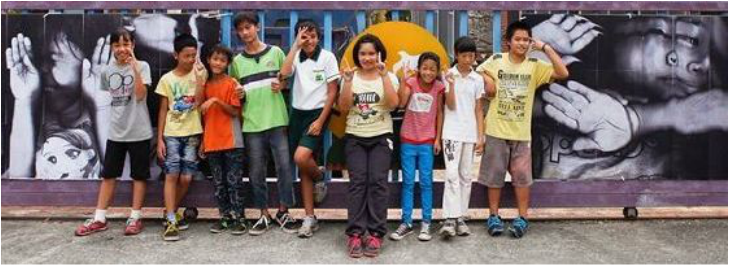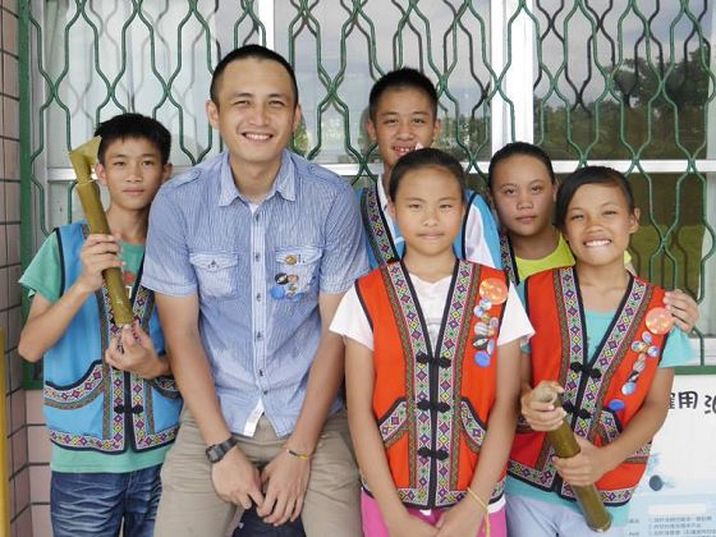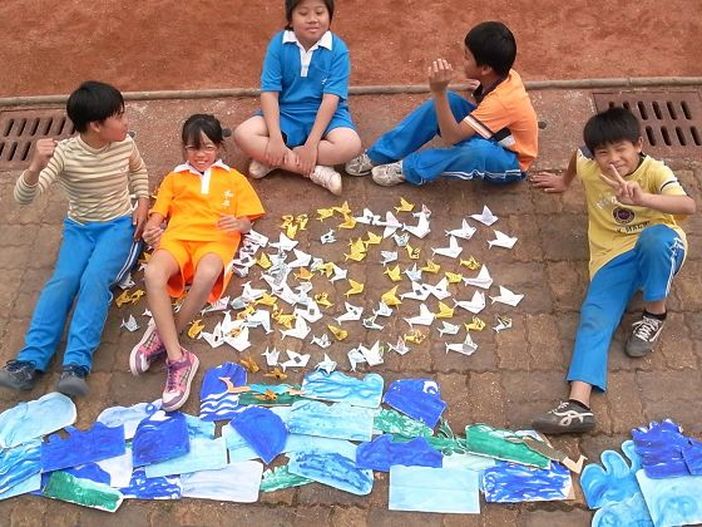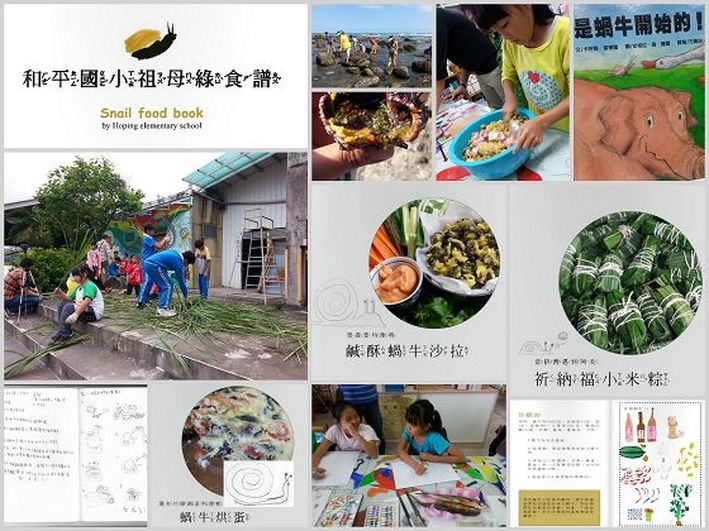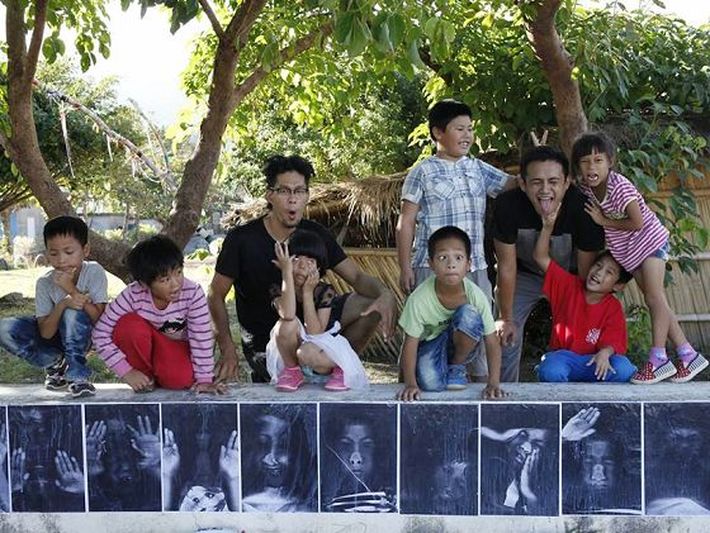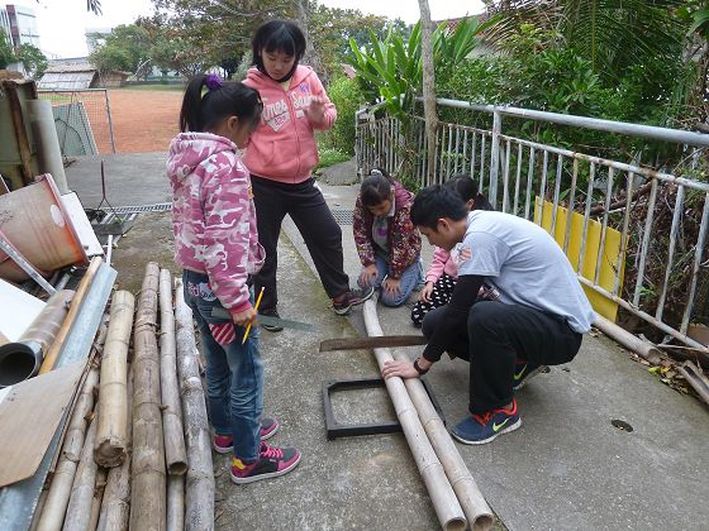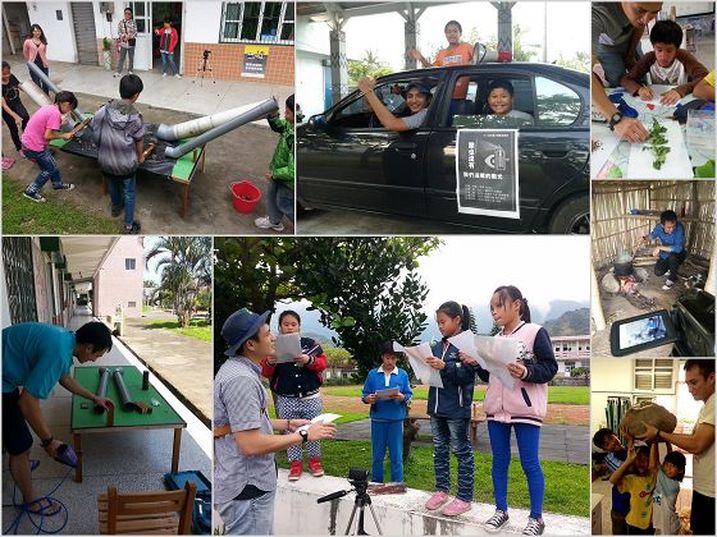Stimulate Students’ Lifelong Passion for Learning by Connecting Life and Art
Translated and edited by Lydia Lu and Constance Chiang
“You are part of my life, and I am part of yours. My life has been enhanced because of your participation. You are not too small to experience the excitement of life. As long as you believe in me, we can embark on this journey together. You may be the work that I am sculpturing this time. Next time you may be the creator of my life experience.” This is what Chen Hao-yi, teacher at the Hoping Elementary School in Taitung, wants to tell his students.
Situated in Hoping Tribe, Chenggong, Taitung, Hoping Elementary School is a petite school of art with 80% of its students from the Amis tribe of origin. Nicknamed the “Good Will Teacher” (the pronunciation of his Chinese name “Hoa-yi” is similar to “good will” in Chinese) by kids in school, Chen used to be an organizer of art exhibitions in Taipei before becoming a teacher. With his extensive art experience, he soon realized that the traditional way of teaching art failed to help the students to showcase their real talents and the syllabus had no connection to the life experience of neither his or the students. He then started a new approach integrating humanity and art into the students’ life experiences and centered on stimulating the students’ lifelong passion for learning. Since August 2011, he has been with the Hoping Elementary School for 3 years.
Situated in Hoping Tribe, Chenggong, Taitung, Hoping Elementary School is a petite school of art with 80% of its students from the Amis tribe of origin. Nicknamed the “Good Will Teacher” (the pronunciation of his Chinese name “Hoa-yi” is similar to “good will” in Chinese) by kids in school, Chen used to be an organizer of art exhibitions in Taipei before becoming a teacher. With his extensive art experience, he soon realized that the traditional way of teaching art failed to help the students to showcase their real talents and the syllabus had no connection to the life experience of neither his or the students. He then started a new approach integrating humanity and art into the students’ life experiences and centered on stimulating the students’ lifelong passion for learning. Since August 2011, he has been with the Hoping Elementary School for 3 years.
As a graduate of Teachers’ College and also an experienced art exhibition organizer, Chen knows very well the curriculum of Teachers’ College. Coming from a similar background as most of his students, he also understands what his students’ competitive disadvantages are. He saw a silver lining when he learned that Hoping Elementary had received 19 cameras for the “Open a New Vista for Children” photography project supported by The Alliance Cultural Foundation. He selected 5 cameras that were of better condition and asked senior students to shoot the facial expressions/movements of a person on a daily basis. Students then turned the daily shots into motion pictures.
“You have to do one thing over and over again to some extreme until you fully appreciate the subtlety!” Chen insists that curriculum has to be connected to what happens in the world. During the 2012 protest against dumping nuclear waste in Lanyu (Orchid Island), Chen asked his students to make origami of flying fish (which is common in Lanyu) in the art class. To help the students to better understand the protest, he also asked them to read books by an aboriginal marine writer. He then led the students to create stage props such as whales, dolphins, fishing boats and waves. Using these stage props and the more than 1000 pictures captured by the students, they jointly created a motion picture called “Friends of Flying Fish.”
On the last day before he left the school for his compulsory military service, Chen invited the entire school to help him shave off his hair. Five kids in his class documented the entire process using a camera’s Stop Motion function and turned it into a performance art. All of a sudden, each strand of his hair seemed to be connecting with everyone at school: one strand after another, stronger and stronger. Chen fully understood that learning without doing can be easily forgotten; therefore, he used his head and the images documented by the kids’ cameras to create a long-lasting memory for his students.
“You have to do one thing over and over again to some extreme until you fully appreciate the subtlety!” Chen insists that curriculum has to be connected to what happens in the world. During the 2012 protest against dumping nuclear waste in Lanyu (Orchid Island), Chen asked his students to make origami of flying fish (which is common in Lanyu) in the art class. To help the students to better understand the protest, he also asked them to read books by an aboriginal marine writer. He then led the students to create stage props such as whales, dolphins, fishing boats and waves. Using these stage props and the more than 1000 pictures captured by the students, they jointly created a motion picture called “Friends of Flying Fish.”
On the last day before he left the school for his compulsory military service, Chen invited the entire school to help him shave off his hair. Five kids in his class documented the entire process using a camera’s Stop Motion function and turned it into a performance art. All of a sudden, each strand of his hair seemed to be connecting with everyone at school: one strand after another, stronger and stronger. Chen fully understood that learning without doing can be easily forgotten; therefore, he used his head and the images documented by the kids’ cameras to create a long-lasting memory for his students.
No matter if it is an image guerrilla, Pit Firing using driftwood or Indian sand pictures, Chen never stops coming up with new ways of exploring art. He considers his students a living art work that he is continuously working on. To him, kids are fully capable of solo presenting what he likes and what he has passion to research on. As long as the teacher can figure out what they are passionate about, the kids, with appropriate skills and coaching, will continue to learn.
“I think our educational system promotes separating different disciplines. Math has nothing to do with humanity. Humanity makes no connection to science. Art class becomes make-up math or humanity class. This type of education system will not help the students. You do not divide kids’ life as you divide curriculum into different subjects like math, humanity and science. Learning should be cross-disciplined because reality is cross-disciplined. For example, to make a table, you need to know math, crafting, art, and design. The boundary between different subjects should be removed. Kids should learn how to work as a team to do something that everyone cares.”
Chen started using tablets in class, encouraging students to use the internet to research, discuss and work on group projects. When they were doing group projects, kids discussed various solutions and, if no solution were readily available, they would seek help from others. In the group setting, kids learn to understand their own strengths and weaknesses and to take advantage of other people’s strengths to make up for their own weaknesses. “Everyone is different”, said Chen, “Our education system has been focusing on eliminating the differences among students. Difference is not necessarily a bad thing. What difference really means is that each one of us has our own strengths. Why don’t we just reinforce each kid’s strengths and make every one happier?”
“I think our educational system promotes separating different disciplines. Math has nothing to do with humanity. Humanity makes no connection to science. Art class becomes make-up math or humanity class. This type of education system will not help the students. You do not divide kids’ life as you divide curriculum into different subjects like math, humanity and science. Learning should be cross-disciplined because reality is cross-disciplined. For example, to make a table, you need to know math, crafting, art, and design. The boundary between different subjects should be removed. Kids should learn how to work as a team to do something that everyone cares.”
Chen started using tablets in class, encouraging students to use the internet to research, discuss and work on group projects. When they were doing group projects, kids discussed various solutions and, if no solution were readily available, they would seek help from others. In the group setting, kids learn to understand their own strengths and weaknesses and to take advantage of other people’s strengths to make up for their own weaknesses. “Everyone is different”, said Chen, “Our education system has been focusing on eliminating the differences among students. Difference is not necessarily a bad thing. What difference really means is that each one of us has our own strengths. Why don’t we just reinforce each kid’s strengths and make every one happier?”
Hoping Elementary has a publication of its own called “Hoping Elementary’s Cumuli Recipe” (Cumuli means “snail” in Amis language). This publication is a month-long cross-disciplined project by Hoping’s kids and a local artist in residence – Chang En Man. During the one month period, kids read snail related books in humanity class to understand the importance of snail in the aboriginal cuisine and culture. In science, they went outdoors to collect snails and observe their behavior. In art class, kids invited the artist to their homes. They interviewed their parents to learn how to make various snail cuisine and finally produced together the recipes book.
“Through this process, kids learn to know what connects cuisine and art, and also to learn to ask questions and to make the best use of their knowledge. The end product - Cumuli Recipe - is at most a digital file. The real art work is the process of creating the recipe from scratch. Process, not the end product, is the most important part of the learning experience.
“Through this process, kids learn to know what connects cuisine and art, and also to learn to ask questions and to make the best use of their knowledge. The end product - Cumuli Recipe - is at most a digital file. The real art work is the process of creating the recipe from scratch. Process, not the end product, is the most important part of the learning experience.
Another project that the Hoping kids worked on involved turning images into art. Chen invited a local artist who uses scanned images as a medium of his art work to illustrate that images are not limited only to computer-aided graphing and photographs. The artist had the kids’ faces and body scanned and enlarged to become a poster. The collection of these facial and body expressions were then posted on the school walls and became a collective art work project called “You See Me.” When posted on the wall at home, these scanned images became a family documentary. When posted on the walls of the community, these images became a cultural landscape. The collection of images exerted a unique impact when they were placed in different locations. Chen called it “Poster Guerrilla.” Different from languages, images made a vivid and powerful claim. Students started to apply similar techniques to non-human things such as balks, bugs or even weeds.
The traditional way of teaching involves only classroom lectures. Chen believes the old ways limits the scope of the kids’ learning. “I know what the problem is. I am here to solve the problem. I am not daunted by the limits imposed by the existing system.” He does not care that he needs to do extra work: discussing the syllabus with the artists beforehand; preparing materials for the projects; arranging logistics for the outdoor activities; documenting the process; and tidying up at the end. Despite all these additional workload, he continues to invite artists to come to his classroom.
“I know it so well that team work is an important experience that kids need to gain. Through the cooperative relationship with others, students learn to appreciate different perspectives. This is a powerful experience which may not show its impact immediately, but it will come up somewhere down the road and kids will learn to deal with problems independently.”
He told his kids that there are things he will never be able to teach – something which will grow naturally out of you after you work with others. He doesn’t wait until his students enter into the adult world to tell them the reality is cruel. He wants his students to know what reality is when they are still at school. He allows kids to get out of their comfort zone; to make mistakes; to cross over the border line and to feel what these experiences are like. When Chen was invited to make a speech, he would bring along his students. He lets them speak in front of an adult audience to feel first-hand the impact of reality.
“I know it so well that team work is an important experience that kids need to gain. Through the cooperative relationship with others, students learn to appreciate different perspectives. This is a powerful experience which may not show its impact immediately, but it will come up somewhere down the road and kids will learn to deal with problems independently.”
He told his kids that there are things he will never be able to teach – something which will grow naturally out of you after you work with others. He doesn’t wait until his students enter into the adult world to tell them the reality is cruel. He wants his students to know what reality is when they are still at school. He allows kids to get out of their comfort zone; to make mistakes; to cross over the border line and to feel what these experiences are like. When Chen was invited to make a speech, he would bring along his students. He lets them speak in front of an adult audience to feel first-hand the impact of reality.
Chen enjoys discovering what children like. Tree house is another project Chen is currently doing to satisfy children’s “need for play.” Chen collaborates with artists to build a children’s tree house, knowing that children are enthusiastic about tree climbing. It might seem like encouraging children to climb trees serves no educational purposes; yet to Chen, it is these “no particular purposes” that are the most meaningful part. He firmly believes that children absorb, learn and thrive the best by doing their favorite activities.
His teaching also emphasizes on “coincidence”! For example, if a child discovers a bird nest by accident, and coincidentally he's having a class on tree houses, Chen would incorporate that into his art class by asking the students to make a birdhouse. “Teachers need to have a high degree of sensitivity of an artist, to be able to quickly grasp what students like, and incorporate these into their classes. This way, classes will become more interesting, and ideas from learning will be more spreadable.”
Chen also helps his students to create their own portfolios through videos, animations, electronic books, posters and comics; hoping that if one day they run into challenges, they would be able to find the work they had done together online, and use these experiences to guide their future paths.
“Teaching is mutual and sensory; it is a creative process that is very close to our own souls. I hope we can drop the boundaries that are found in the current education and stop breaking students’ childhood into bits and pieces; to me, teaching means assisting children to search for their own identities, to express who they truly are, and to motivate them to live their fullest lives possible.”
His teaching also emphasizes on “coincidence”! For example, if a child discovers a bird nest by accident, and coincidentally he's having a class on tree houses, Chen would incorporate that into his art class by asking the students to make a birdhouse. “Teachers need to have a high degree of sensitivity of an artist, to be able to quickly grasp what students like, and incorporate these into their classes. This way, classes will become more interesting, and ideas from learning will be more spreadable.”
Chen also helps his students to create their own portfolios through videos, animations, electronic books, posters and comics; hoping that if one day they run into challenges, they would be able to find the work they had done together online, and use these experiences to guide their future paths.
“Teaching is mutual and sensory; it is a creative process that is very close to our own souls. I hope we can drop the boundaries that are found in the current education and stop breaking students’ childhood into bits and pieces; to me, teaching means assisting children to search for their own identities, to express who they truly are, and to motivate them to live their fullest lives possible.”

